论美国英语中的时间观念
美国人的时间观念英语作文
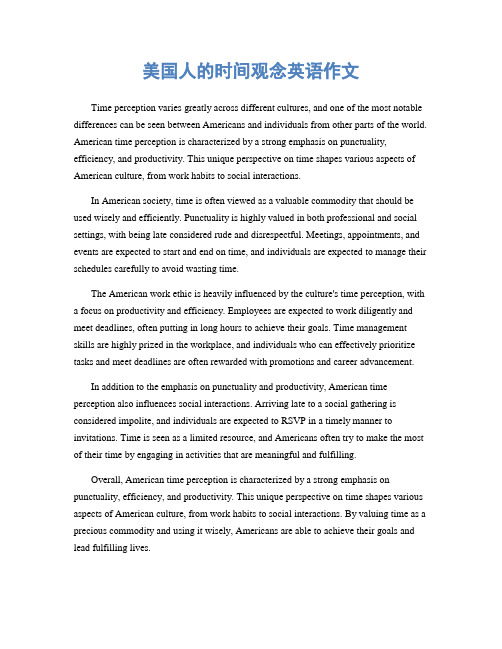
美国人的时间观念英语作文Time perception varies greatly across different cultures, and one of the most notable differences can be seen between Americans and individuals from other parts of the world. American time perception is characterized by a strong emphasis on punctuality, efficiency, and productivity. This unique perspective on time shapes various aspects of American culture, from work habits to social interactions.In American society, time is often viewed as a valuable commodity that should be used wisely and efficiently. Punctuality is highly valued in both professional and social settings, with being late considered rude and disrespectful. Meetings, appointments, and events are expected to start and end on time, and individuals are expected to manage their schedules carefully to avoid wasting time.The American work ethic is heavily influenced by the culture's time perception, with a focus on productivity and efficiency. Employees are expected to work diligently and meet deadlines, often putting in long hours to achieve their goals. Time management skills are highly prized in the workplace, and individuals who can effectively prioritize tasks and meet deadlines are often rewarded with promotions and career advancement.In addition to the emphasis on punctuality and productivity, American time perception also influences social interactions. Arriving late to a social gathering is considered impolite, and individuals are expected to RSVP in a timely manner to invitations. Time is seen as a limited resource, and Americans often try to make the most of their time by engaging in activities that are meaningful and fulfilling.Overall, American time perception is characterized by a strong emphasis on punctuality, efficiency, and productivity. This unique perspective on time shapes various aspects of American culture, from work habits to social interactions. By valuing time as a precious commodity and using it wisely, Americans are able to achieve their goals and lead fulfilling lives.。
英语论文(中美文化差异)

英语论文(中美文化差异)英语论文(中美文化差异)一、引言英语作为一门全球通用语言,对于中美文化交流具有重要意义。
本篇论文旨在探讨中美文化差异,并分析这些差异对语言和交际的影响。
二、中美价值观差异在中美文化中,价值观差异是最明显的方面之一。
中美两个国家有着不同的历史、宗教和社会背景,这导致了他们在价值观上存在一定的差异。
1. 个人主义与集体主义美国文化倾向于个人主义,注重个体的独立和自主性。
而中国文化则强调集体主义,重视家庭和团体的集体利益。
这种差异在语言交际中表现明显,比如在表达感谢之情时,美国人更倾向于使用“I thank you”这样的第一人称表达方式,而中国人则更倾向于使用“We thank you”来强调团体的感谢之情。
2. 时间观念与未来导向美国人注重效率和时间观念,强调将时间用于创造价值。
相比之下,中国文化更加注重历史和传统,对未来的展望较为谨慎。
这种差异在商务交流中体现明显,美国人常常在商务会议上强调时间管理和准时守约,而中国人更注重人际关系的建立和发展。
三、语言差异中美文化差异也在语言使用上得到体现。
1. 礼貌用语中美两国在礼貌用语方面存在差异。
美国人更倾向于使用直接的表达方式,比如“Please pass the salt”。
而中国人常常使用委婉的方式,比如“麻烦你帮我递一下盐”。
这种差异反映了中美两国之间在社交场合中的不同习惯和礼貌观念。
2. 言语间断和暗示中美文化中存在着对言语间断和暗示的不同需求。
美国人更倾向于直接了当地表达自己的意图,喜欢在交流中保持比较连贯的语言流程。
而中国人更喜欢使用间接的方式表达自己的意图,有时候在表达上更多地依靠暗示和上下文的理解。
这种差异在商务谈判和日常社交中都能观察到。
四、沟通方式差异受到文化差异的影响,中美人民在交际中采用不同的沟通方式。
1. 非语言表达在非语言表达上,中美文化也存在着差异。
美国人更加直接和开放地表达情感,通过面部表情、肢体动作和眼神交流来表达自己的意思。
美国时间观英文作文
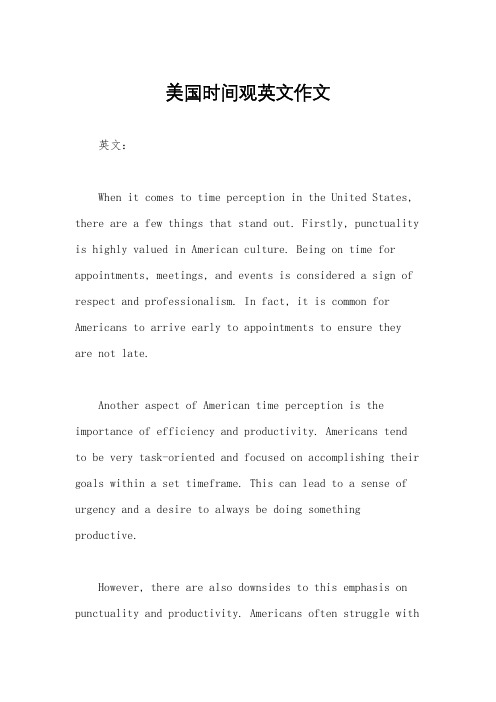
美国时间观英文作文英文:When it comes to time perception in the United States, there are a few things that stand out. Firstly, punctuality is highly valued in American culture. Being on time for appointments, meetings, and events is considered a sign of respect and professionalism. In fact, it is common for Americans to arrive early to appointments to ensure they are not late.Another aspect of American time perception is the importance of efficiency and productivity. Americans tend to be very task-oriented and focused on accomplishing their goals within a set timeframe. This can lead to a sense of urgency and a desire to always be doing something productive.However, there are also downsides to this emphasis on punctuality and productivity. Americans often struggle withwork-life balance and may prioritize work over their personal lives. Additionally, the pressure to always be productive can lead to burnout and stress.Overall, time perception in the United States is characterized by a strong emphasis on punctuality and productivity, but also a need for balance and self-care.中文:谈到美国的时间观,有几个方面值得注意。
美国人的特征,与中国人的区别英语作文

美国人与中国人:文化差异与个人特征**Americans vs. Chinese: Cultural Differences and Individual Traits**The United States and China, two vast countries separated by vast distances and even vaster cultural divides, have given birth to two distinct peoples with unique characteristics and traits. While there are similarities in human nature across the globe, the American and Chinese people, shaped by their respective environments, histories, and traditions, exhibit profound differences in their behavior, values, and way of life.**Individualism vs. Collectivism**At the core of American culture lies a strong emphasis on individualism. Americans are encouraged from childhoodto think independently, speak their minds, and pursue their dreams, often placing personal happiness and fulfillment above societal norms or collective interests. Conversely, Chinese culture promotes collectivism, where the welfareand harmony of the group or society are paramount.Individuals are expected to conform to social norms and prioritize the collective interests over their own.**Communication Style**Communication styles between Americans and Chinese also differ significantly. Americans tend to be more direct and assertive in their communication, often expressing their opinions and feelings openly and honestly. Conversations among Americans are typically informal and conversational, with a focus on the present and future. On the other hand, Chinese communication tends to be more indirect and polite, with an emphasis on maintaining harmony and avoiding conflict. Chinese conversations often involve subtle nuances and implied meanings that require a deeper understanding of cultural context to interpret.**Attitude towards Time**The perception of time also differs between the two cultures. Americans generally adhere to a strict schedule and prioritize punctuality, viewing time as a finite resource that should be used efficiently. By contrast, Chinese culture is more flexible and adaptive in its approach to time. Flexibility and adaptability are valued,and punctuality is often seen as less critical than maintaining relationships and social harmony.**Education and Career**Education and career paths also reflect the distinct values of each culture. Americans place a high value on academic achievements and professional success, often viewing these as markers of personal worth and success. The American education system typically encourages critical thinking, innovation, and competition. Conversely, Chinese culture values education as a means to secure a stable and respected position in society, with a focus on服从纪律 and collective interests. The Chinese education system tends to emphasize discipline, hard work, and respect for authority. In conclusion, while there are many similarities between the American and Chinese people, their distinct cultural backgrounds and values have given rise to profound differences in their behavior, communication styles, time perception, and approach to education and career. Understanding these differences is crucial in bridging the cultural divide and fostering better understanding and cooperation between the two nations.**美国人与中国人:文化差异与个人特征**美国和中国,这两个相隔甚远的国家,因其各自的环境、历史和传统,塑造了两个具有独特特性和行为的民族。
时间观念的英语作文
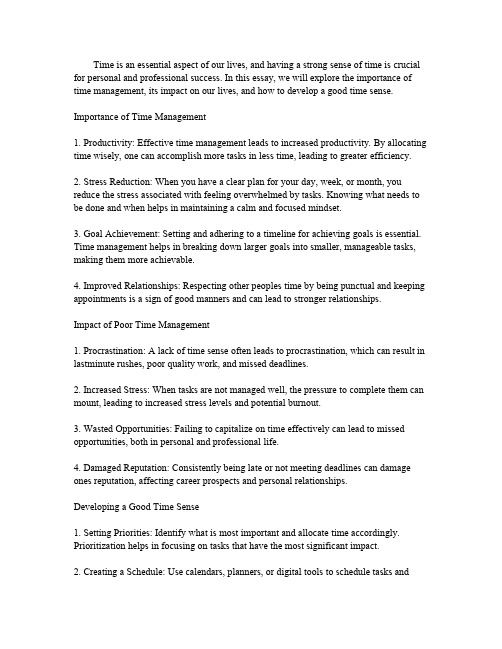
Time is an essential aspect of our lives,and having a strong sense of time is crucial for personal and professional success.In this essay,we will explore the importance of time management,its impact on our lives,and how to develop a good time sense.Importance of Time Management1.Productivity:Effective time management leads to increased productivity.By allocating time wisely,one can accomplish more tasks in less time,leading to greater efficiency.2.Stress Reduction:When you have a clear plan for your day,week,or month,you reduce the stress associated with feeling overwhelmed by tasks.Knowing what needs to be done and when helps in maintaining a calm and focused mindset.3.Goal Achievement:Setting and adhering to a timeline for achieving goals is essential. Time management helps in breaking down larger goals into smaller,manageable tasks, making them more achievable.4.Improved Relationships:Respecting other peoples time by being punctual and keeping appointments is a sign of good manners and can lead to stronger relationships.Impact of Poor Time Management1.Procrastination:A lack of time sense often leads to procrastination,which can result in lastminute rushes,poor quality work,and missed deadlines.2.Increased Stress:When tasks are not managed well,the pressure to complete them can mount,leading to increased stress levels and potential burnout.3.Wasted Opportunities:Failing to capitalize on time effectively can lead to missed opportunities,both in personal and professional life.4.Damaged Reputation:Consistently being late or not meeting deadlines can damage ones reputation,affecting career prospects and personal relationships.Developing a Good Time Sense1.Setting Priorities:Identify what is most important and allocate time accordingly. Prioritization helps in focusing on tasks that have the most significant impact.2.Creating a Schedule:Use calendars,planners,or digital tools to schedule tasks andactivities.A visual representation of your time can help in better planning.3.Breaking Down Tasks:Large projects can be overwhelming.Breaking them down into smaller tasks can make them more manageable and less daunting.4.Avoiding Multitasking:While it may seem efficient,multitasking can often lead to mistakes and decreased productivity.Focusing on one task at a time can lead to better results.5.Setting Deadlines:Deadlines create a sense of urgency and can motivate individuals to complete tasks more efficiently.6.Learning to Say No:Overcommitting can lead to poor time management.Knowing when to decline additional tasks is crucial for maintaining a manageable workload.7.Regular Review:Regularly reviewing your schedule and progress towards goals can help in adjusting your time management strategies as needed.ing Technology:There are numerous apps and tools designed to assist with time management,from simple timers to comprehensive project management software.9.Building Buffer Time:Always include some buffer time in your schedule for unexpected events or tasks that take longer than anticipated.10.SelfDiscipline:Ultimately,having a good time sense requires selfdiscipline.Sticking to your schedule and being consistent in your efforts is key.In conclusion,a strong sense of time is a skill that can significantly enhance ones personal and professional life.By understanding the importance of time management, recognizing the consequences of poor time management,and implementing strategies to develop a good time sense,individuals can achieve greater success and satisfaction in their endeavors.。
课程思政教案英语 U4

课程思政设计:通过分析文中作者守时经历内容,深刻理解到守时在商业文化中的重要性。
教学方法:讨论,展示,练习课程思政设计:通过分享自己的守时故事,加深学生对守时所带来的好处的认识。
教学方法:讨论同伴学习讲练结合任务三:体会文章中不同时态用法活动一:通过iSmart微课内容复习不同时态。
学生观看常用英语时态视频,区分一般时态、进行时态、完成时态、现在完成进行时态以及过去将来时态。
教师进行总结。
活动二:找时态,我最快。
学生以小组为单位,寻找文中3—4段描述作者守时经历时使用的不同时态,并在文中标注出来。
活动三:展示并说明各小组派代表展示本小组寻找的时态例句,并说明时态类型以及使用该时态的原因。
教师与其他小组成员进行查漏补缺。
活动四:语法练习完成书本相关语法练习。
课程思政设计:通过分析与理解不同文化不同的时间观念,加深学生对不同文化的认知,尊重不同文化。
教学方法:分析讨论,展示任务四:守时故事写作活动一:独立写作基于阅读中有关时间的词汇积累与时态知识复习,将自己的守时相关故事进行描写,提交至iSmart平台。
活动二:大家来找茬教师选取1篇文章,让学生进行错误查找,重点查看时态是否正确、时间表达词语是否运用准确。
活动三:同伴互评根据例文分析,同伴交换文章检查错误并修改。
任务五:体会不同文化差异活动一:分析文中体现文化差异的段落。
找出文中最能体现美国与印度对于时间观念有差异的词语或者句子。
( 1.Being afraid that I had missed the appointment, I hurried in, and found them happily c hatting together. Their attitude was “Ah! You’re here! We can start now!”2. If the team had been American, it’s likely that they would have been annoyed, and unlikely that they would have waited more than 10 minutes — at the most.)活动二:分组搜索网络资源找出中国文化中对于守时的推崇(参考教材P70内容)。
美国人的时间观念英语作文

美国人的时间观念The American culture is renowned for its strong emphasis on punctuality and time management. Americans place a high value on respecting others' time, and they expect the same courtesy in return. In this essay, we will explore the significance of time in American culture, the underlying reasons for this emphasis, and how it impacts daily life.Punctuality is a cornerstone of American society. It is not merely a matter of courtesy; it is often viewed as a reflection of one's character and respect for others. Americans are accustomed to planning their daily schedules meticulously, and any deviation from the set schedule is generally viewed as disruptive and inconvenient. Whetherit's a business meeting, a social event, or a simple lunch date, being on time is expected. Arriving late is often considered disrespectful and can even affect professional relationships.This strong emphasis on punctuality is rooted in the American culture's deep-seated belief in efficiency and productivity. Time is seen as a limited resource, andwasting it is unacceptable. Americans believe that by being punctual and organized, they can maximize their efficiency and achieve more in a given period. This mindset isreflected in various aspects of American life, from the structured workday to the precision with which they plan their vacations.Moreover, the American time culture is also shaped by the country's historical and social context. The American Dream, which emphasizes individual success and upward mobility, encourages people to value their time highly. Ina society where success is often measured by achievements and accomplishments, being able to manage one's time effectively is seen as a crucial skill.However, this strong emphasis on punctuality and time management can also be a double-edged sword. On the one hand, it fosters a culture of efficiency and productivity, which can lead to significant advancements and achievements. On the other hand, it can create significant pressure and anxiety, especially when dealing with unexpected delays or setbacks. The constant pursuit of efficiency can sometimes come at the cost of flexibility and adaptability.In conclusion, the American time culture is a complex phenomenon that is shaped by a combination of cultural values, historical context, and social expectations. The strong emphasis on punctuality and time management is a reflection of the American culture's belief in efficiency and productivity. While it has numerous benefits, it also has its downsides, such as the pressure and anxiety it can create. Understanding and respecting this cultural difference is crucial for effective cross-cultural communication and understanding.**美国人的时间观念**美国文化以其对守时和时间管理的强烈重视而闻名。
浅谈中美商人商务英语谈判的风格差异
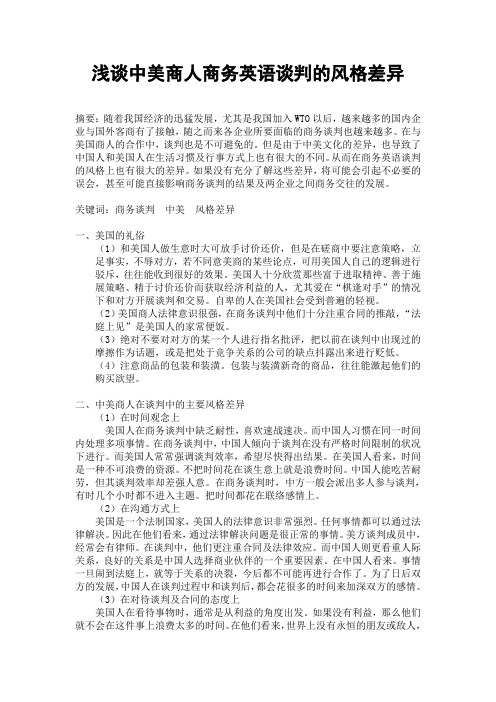
浅谈中美商人商务英语谈判的风格差异摘要:随着我国经济的迅猛发展,尤其是我国加入WTO以后,越来越多的国内企业与国外客商有了接触,随之而来各企业所要面临的商务谈判也越来越多。
在与美国商人的合作中,谈判也是不可避免的。
但是由于中美文化的差异,也导致了中国人和美国人在生活习惯及行事方式上也有很大的不同。
从而在商务英语谈判的风格上也有很大的差异。
如果没有充分了解这些差异,将可能会引起不必要的误会,甚至可能直接影响商务谈判的结果及两企业之间商务交往的发展。
关键词:商务谈判中美风格差异一、美国的礼俗(1)和美国人做生意时大可放手讨价还价,但是在磋商中要注意策略,立足事实,不辱对方,若不同意美商的某些论点,可用美国人自己的逻辑进行驳斥,往往能收到很好的效果。
美国人十分欣赏那些富于进取精神、善于施展策略、精于讨价还价而获取经济利益的人,尤其爱在“棋逢对手”的情况下和对方开展谈判和交易。
自卑的人在美国社会受到普遍的轻视。
(2)美国商人法律意识很强,在商务谈判中他们十分注重合同的推敲,“法庭上见”是美国人的家常便饭。
(3)绝对不要对对方的某一个人进行指名批评,把以前在谈判中出现过的摩擦作为话题,或是把处于竞争关系的公司的缺点抖露出来进行贬低。
(4)注意商品的包装和装潢。
包装与装潢新奇的商品,往往能激起他们的购买欲望。
二、中美商人在谈判中的主要风格差异(1)在时间观念上美国人在商务谈判中缺乏耐性,喜欢速战速决。
而中国人习惯在同一时间内处理多项事情。
在商务谈判中,中国人倾向于谈判在没有严格时间限制的状况下进行。
而美国人常常强调谈判效率,希望尽快得出结果。
在美国人看来,时间是一种不可浪费的资源。
不把时间花在谈生意上就是浪费时间。
中国人能吃苦耐劳,但其谈判效率却差强人意。
在商务谈判时,中方一般会派出多人参与谈判,有时几个小时都不进入主题。
把时间都花在联络感情上。
(2)在沟通方式上美国是一个法制国家,美国人的法律意识非常强烈。
第三版新视野大学英语2文章翻译
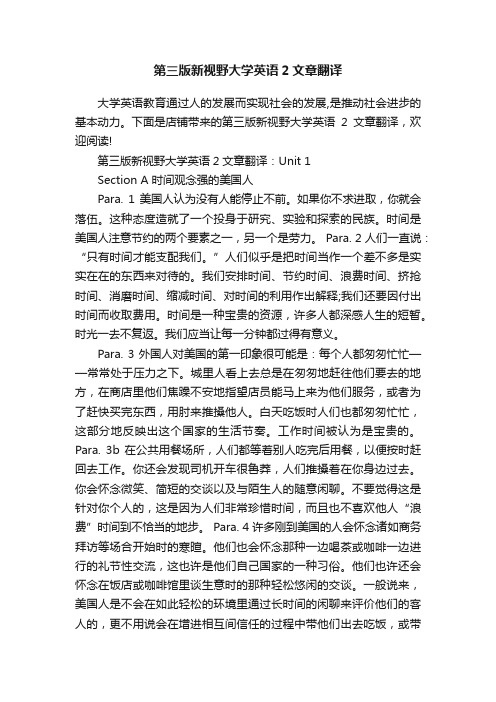
第三版新视野大学英语2文章翻译大学英语教育通过人的发展而实现社会的发展,是推动社会进步的基本动力。
下面是店铺带来的第三版新视野大学英语2文章翻译,欢迎阅读!第三版新视野大学英语2文章翻译:Unit 1Section A 时间观念强的美国人Para. 1 美国人认为没有人能停止不前。
如果你不求进取,你就会落伍。
这种态度造就了一个投身于研究、实验和探索的民族。
时间是美国人注意节约的两个要素之一,另一个是劳力。
Para. 2 人们一直说:“只有时间才能支配我们。
”人们似乎是把时间当作一个差不多是实实在在的东西来对待的。
我们安排时间、节约时间、浪费时间、挤抢时间、消磨时间、缩减时间、对时间的利用作出解释;我们还要因付出时间而收取费用。
时间是一种宝贵的资源,许多人都深感人生的短暂。
时光一去不复返。
我们应当让每一分钟都过得有意义。
Para. 3 外国人对美国的第一印象很可能是:每个人都匆匆忙忙——常常处于压力之下。
城里人看上去总是在匆匆地赶往他们要去的地方,在商店里他们焦躁不安地指望店员能马上来为他们服务,或者为了赶快买完东西,用肘来推搡他人。
白天吃饭时人们也都匆匆忙忙,这部分地反映出这个国家的生活节奏。
工作时间被认为是宝贵的。
Para. 3b 在公共用餐场所,人们都等着别人吃完后用餐,以便按时赶回去工作。
你还会发现司机开车很鲁莽,人们推搡着在你身边过去。
你会怀念微笑、简短的交谈以及与陌生人的随意闲聊。
不要觉得这是针对你个人的,这是因为人们非常珍惜时间,而且也不喜欢他人“浪费”时间到不恰当的地步。
Para. 4 许多刚到美国的人会怀念诸如商务拜访等场合开始时的寒暄。
他们也会怀念那种一边喝茶或咖啡一边进行的礼节性交流,这也许是他们自己国家的一种习俗。
他们也许还会怀念在饭店或咖啡馆里谈生意时的那种轻松悠闲的交谈。
一般说来,美国人是不会在如此轻松的环境里通过长时间的闲聊来评价他们的客人的,更不用说会在增进相互间信任的过程中带他们出去吃饭,或带他们去打高尔夫球。
新视野大学英语第二册unit 1 Time-conscious_Americans-4
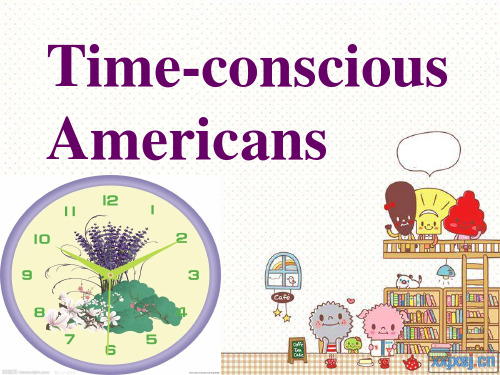
Time is life and when the idle man kills time, he kills himself.
时间就是生命,懒人消耗时间就是消耗自己的生命。
Time flies like an arrow (shuttle), and time lost never returns.
光阴似箭,一去不返。
时间观念很强的美国人 有这样一种说法,即:美国人是“钟表的 奴隶”(Americans are slaves to nothing but the clock.)。对他们来说,时间简直就是一种 珍贵的商品。 通常情况下,美国人是不会与记者进行长 时间闲谈的;也不会把时间花费在饭桌前,通 过宴请客人来建立友谊关系或联络感情。对大 多数人来说,友好关系远没有实际表现重要。 所以,在与客人简单、礼节性地寒暄后, 他们很快就会谈及正题。由于 人们非常珍惜时间,他们很讨厌
Time-conscious Americans
一年之计在于春,一天之计在于晨。 The whole year’s work depends on a good start in spring,the whole day’s work depends on a good start in the morning.
Consequently, Americans try every means to save time in their daily life, business and work so as to make every minute count. Besides, to solve a problem or fulfill a job with speed in U.S.A is taken as a sign of skillfulness or being competent.
跨文化交际论文参考题目
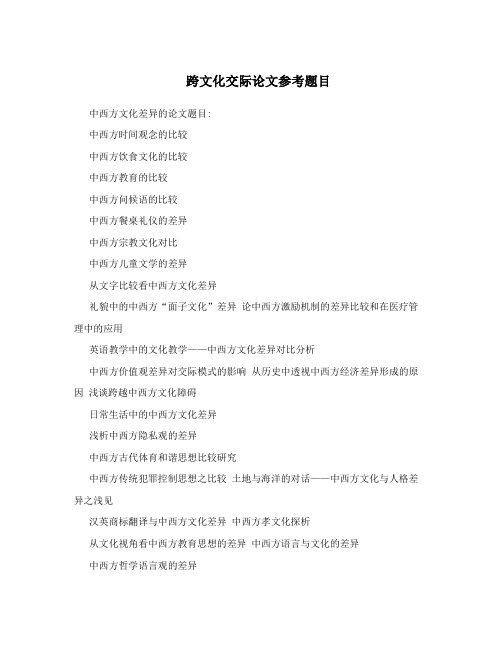
跨文化交际论文参考题目中西方文化差异的论文题目:中西方时间观念的比较中西方饮食文化的比较中西方教育的比较中西方问候语的比较中西方餐桌礼仪的差异中西方宗教文化对比中西方儿童文学的差异从文字比较看中西方文化差异礼貌中的中西方“面子文化”差异论中西方激励机制的差异比较和在医疗管理中的应用英语教学中的文化教学——中西方文化差异对比分析中西方价值观差异对交际模式的影响从历史中透视中西方经济差异形成的原因浅谈跨越中西方文化障碍日常生活中的中西方文化差异浅析中西方隐私观的差异中西方古代体育和谐思想比较研究中西方传统犯罪控制思想之比较土地与海洋的对话——中西方文化与人格差异之浅见汉英商标翻译与中西方文化差异中西方孝文化探析从文化视角看中西方教育思想的差异中西方语言与文化的差异中西方哲学语言观的差异浅析中西方文化差异对翻译的影响从素质教育看中西方教育的差异及思考中西方立宪文化差异比较——以价值观为视角影响跨文化交际的主要因素——中西方价值观念差异中西方股票期权制度实际操作的差异性分析英美社会与文化论文1. The Contrast and Analyses of Customsin Britain and China英国和中国习俗之研究2. Cultural Connotation of English Names 英语姓名的文化内涵3. Black Culture and American English 黑人文化与美国英语4. The Phenomenon of “PoliticalCorrectness” in American English论美国英语中的政治正确现象5. English Euphemism and Culture 文化因素与委婉语6. Cultural Differences in Address Terms: English and Chinese英汉称呼语中的文化差异7(Influence of Greek Myths to British and American Culture希腊神话与英美文化8. An Investigation on Intercultural Communication Competence and Intercultural Sensitivity Among Chinese College Students 关于中国大学生跨文化交际能力和跨文化敏感度的调查9. Cross-Cultural Awareness in Translating Tourist Materials中国旅游资料翻译中的跨文化意识10. Cross-Cultural Training in Chinese Universities中国大学中的跨文化培训11. Acculturation Strategies among Chinese Overseas Students中国海外留学生的文化适应策略12. On Tour Commentary Translation---An Intercultural Communication Perspective 从跨文化角度看导游词翻译13. Intercultural Communication on the Internet互联网上的跨文化交际14. On the Application of Theatrical Tricks tothe Shake speare’s Dramas论莎士比亚戏剧中的舞台技巧的应用15. The Bible and Western Festivals 《圣经》与西方节日16. On Culture-loaded Animal Words in Cross-Cultural Communication跨文化交际中的动物文化词研究17. The Cultural Differences Between Chinese and English from the Cultural Attached Meaning of Animal Words 从动物词汇看汉英文化的差异18. On Plants Words and Culture 论植物词汇与文化19. On the Cultural Connotations of Color Words in English and Chinese中英颜色词文化内涵研究20. Cross-cultural Communication on the Translation of the Chinese “Long”从中国“龙”字的翻译看跨文化交际21. On English and the Chinese Borrowing Words and the Cultural Differences 论中英借用词与文化差异22. A Contrast of the Symbols of American and Chinese Culture中美文化象征比较研究23. The Contrastive Study on the Courteous Expressions in English and Chinese 英汉礼貌用语对比研究24. Body Language in Non-verbal Communication浅谈非语言交际中的身势语25. Culture Consciousness in the English Language Teaching英语教学中的文化意识26. Reinforcing Equality in Cultural Communication in Cross-cultural Communication跨文化交际应加强文化平等交流意识27. Cross-cultural Difference on the Non-verbal Communication非言语交际的跨文化差异28. Improper Cultural Transferences in Cross-Cultural Communication文化负迁移对跨文化交际的影响29. On Cross-Cultural Communication Phenomenon论跨文化交际现象30. The Difference of Cultural Thinking Between English and Chinese and the Intercultural Communication英汉文化思维差异与跨文化交流31. Chief Factors Affecting Cross-Cultural Communication--- Difference Between Chinese and Western Values影响跨文化交际的主要因素---中西方价值观念差异32. Taboos in Cross-CulturalCommunication--- Probing into the Difference Between Western and Chinese Culture 跨文化交际中的禁忌问题---中西方文化差异之探讨33. Cultural Differences in Cross-Cultural Communication Between Chinese and English Language谈英汉跨文化交际中的文化差异34. The Difference of the Eastern and Western Mode of Thinking and Cross-Cultural Communication中西思维模式差异与跨文化差异35. Cross-Cultural Communication in Interpretation口译中的跨文化交流36. The Cultural Perception and Memory in Intercultural Communication跨文化交流中的文化感知和文化记忆37(Cultural Factors of English Catchwords英语流行语的文化因素38(The Epitome of Contemporary American History and Culture--- Interpreting Forrest Gump当代美国历史和文化的缩影---解读《阿甘正传》39. Body Language in Non-verbalCommunication浅谈非语言交际中的身势语40. Differences and Resources of Addressing in English英汉语中称谓的差异及其成因41. Cultural Interpretations of English and Chinese Names英汉姓名的文化阐释42. Different Body Languages in Different Cultures身势语在不同文化下的差异43. Functions of Non-verbal Behavior in Intercultural Communication非言语行为在跨文化交际中的功能44. The Contrastive Study on the Courteous Expressions in English and Chinese 英汉礼貌用语对比研究45. The Presentation of Different Thinking Modes in Chinese and Western Religious Cultures中西方宗教文化中的不同思维模式46. The Breath of American Slang美国俚语初探47. The Influences of Western Festivals on Chinese Society西方节日对中国社会的影响48. Cultural Migration of Western Festivals 西方节日的文化入侵49. The Influence of Borrowing Words on English and Chinese Vocabulary英汉词语互借对语言文化的影响50(Cross-Cultural Communication in Business World商务领域跨文化现象51(Christianity and American Culture 基督教与美国文化52. The Studies of Chinese Movies and Culture中国电影与文化53. Cultural Implication of Chinese Cuisine 中国饮食文化的内涵54. Diversities of Chinese and Western Culture from the Sources of English and Chinese Idioms从汉英习语来源看中西方文化的差异55. The Social Status of the Blacks in America after the Civil War美国内战后的黑人社会地位56. A Comparison of Garments Culture between the East and the West中西服饰文化对比57. A Research on Cross-Cultural Difficulties in Reading Comprehension影响阅读理解的跨文化因素研究58. The Reasons of Ancient Greek Mythology Influencing the English Language古希腊神话故事对英语语言影响的原因59. A Cultural Perspective on Chinese and Western Trademarks中西方商标的文化视角60(English Idioms and the Western Culture 英语习语和西方文化61. A Tentative Study on English and Chinese Euphemism汉英委婉语研究62(American Place Names and Their Culture 美国地名和文化63(A Comparison of Courtesy Conventions between Chinese and English 汉英礼貌用语的异同64(Animal Words in Chinese and English Idioms and Their Translations 中英习语动物词异同及其翻译65. Cultural Differences on Etiquette betweenChina and Western Countries中西方礼仪文化差异66(Increasing Cultural Awareness of Secondary School Students如何提升中学生的文化意识67(A Comparative Study of Compliments: Cross-Culture Perspectives 从跨文化的角度对比中西方问候语的差异下面的是2016年经典励志语录,需要的朋友可以欣赏,不需要的朋友下载后可以编辑删除~~谢谢~~1、有来路,没退路;留退路,是绝路。
新实用英语读写译教程第二册第二版课件unit 2
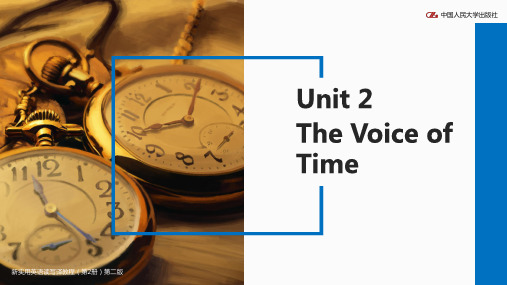
新实用英语读写译教程(第2册)第二版
to make an appointment too far in advance because
plans which are made for a date more gotten. The meaning of time differs in
对美国人而言,有两样东西他们特别节省:时间和人力。有这样一种说法,即:美国人是钟表的奴 隶(slaves to nothing but the clock)。对他们来说,时间好像就是一个看得见的通道,在其中人们可 以节省、安排、浪费、侵占、消磨等。美国人还对时间收费,他们认为时间是一种珍贵商品。许多美国 人对一生时间的短促相当敏感,他们认为时间浪费了是无法弥补的,他们要让每分钟都有价值。
attention.
The same meaning is attached to telephone calls
made after 11:00 pm. If someone receives a call during sleeping
hours, he assumes it’s a matter of life and death. The time
PART Ⅲ Workplace Context
Reading Passage New Words and Expressions Comprehension of the Reading Passage Discussing Topics
中西方待客之道差异英语作文
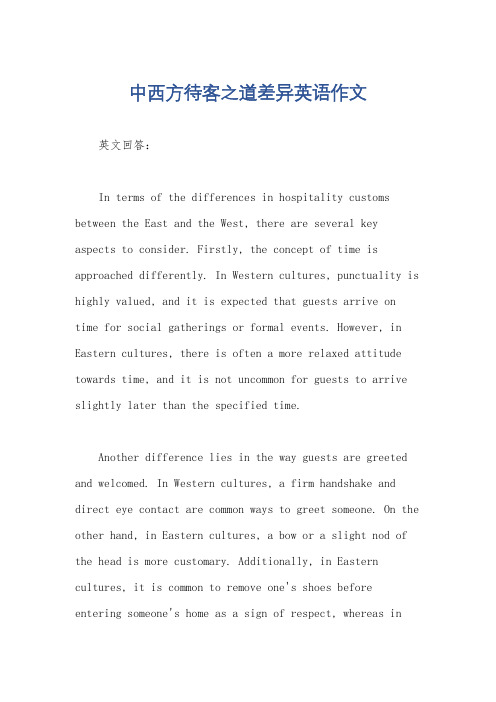
中西方待客之道差异英语作文英文回答:In terms of the differences in hospitality customs between the East and the West, there are several key aspects to consider. Firstly, the concept of time is approached differently. In Western cultures, punctuality is highly valued, and it is expected that guests arrive on time for social gatherings or formal events. However, in Eastern cultures, there is often a more relaxed attitude towards time, and it is not uncommon for guests to arrive slightly later than the specified time.Another difference lies in the way guests are greeted and welcomed. In Western cultures, a firm handshake and direct eye contact are common ways to greet someone. On the other hand, in Eastern cultures, a bow or a slight nod of the head is more customary. Additionally, in Eastern cultures, it is common to remove one's shoes before entering someone's home as a sign of respect, whereas inWestern cultures, this practice is less prevalent.The way meals are conducted also differs between the East and the West. In Western cultures, it is typical for each individual to have their own plate of food, and utensils such as knives, forks, and spoons are used to eat. In contrast, in many Eastern cultures, meals are often served family-style, with multiple dishes placed in the center of the table for everyone to share. Chopsticks are commonly used as eating utensils in many Eastern countries.Furthermore, the concept of personal space varies between the East and the West. In Western cultures, individuals tend to value their personal space and prefer to have some distance between themselves and others, especially when conversing. However, in Eastern cultures, physical proximity is often more accepted, and it is not uncommon for people to stand or sit closer to each other during conversations.中文回答:在东西方的待客之道差异方面,有几个关键方面需要考虑。
中美时间观念英语作文
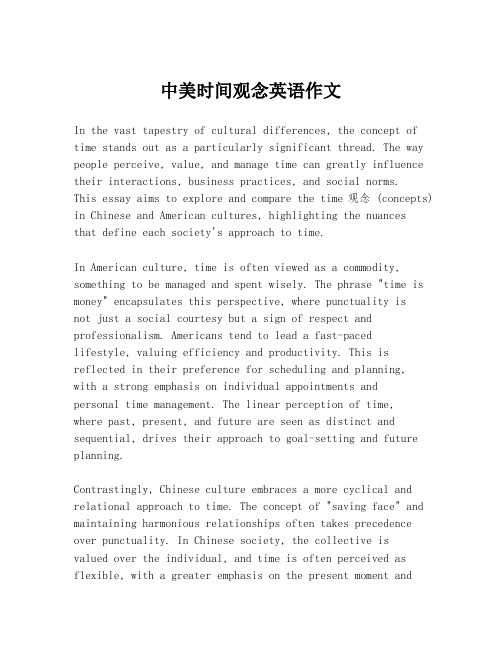
中美时间观念英语作文In the vast tapestry of cultural differences, the concept of time stands out as a particularly significant thread. The way people perceive, value, and manage time can greatly influence their interactions, business practices, and social norms.This essay aims to explore and compare the time观念 (concepts) in Chinese and American cultures, highlighting the nuancesthat define each society's approach to time.In American culture, time is often viewed as a commodity, something to be managed and spent wisely. The phrase "time is money" encapsulates this perspective, where punctuality isnot just a social courtesy but a sign of respect and professionalism. Americans tend to lead a fast-pacedlifestyle, valuing efficiency and productivity. This is reflected in their preference for scheduling and planning,with a strong emphasis on individual appointments andpersonal time management. The linear perception of time,where past, present, and future are seen as distinct and sequential, drives their approach to goal-setting and future planning.Contrastingly, Chinese culture embraces a more cyclical and relational approach to time. The concept of "saving face" and maintaining harmonious relationships often takes precedence over punctuality. In Chinese society, the collective isvalued over the individual, and time is often perceived as flexible, with a greater emphasis on the present moment andthe people involved. This is evident in the practice of "roundtable" decision-making and the common occurrence of "Chinese time," where events may start later than scheduled to accommodate all parties.The business world in both cultures also reflects these differences. In the United States, meetings are typically held to strict schedules, with a clear agenda and time allocated for each item. The focus is on direct communication and achieving specific outcomes within the allotted time. In contrast, Chinese business meetings may be more open-ended, with an initial period dedicated to building relationships and trust before delving into business matters. The importance of 人情 (guanxi), or personal relationships, means that the process of negotiation and decision-making can be more gradual and less time-bound.Educational systems too are influenced by these cultural time perspectives. American schools often operate on a rigid schedule, with classes changing at set times and a strong focus on individual achievement and personal deadlines. Chinese education, while increasingly adopting a more structured approach, traditionally places more emphasis on group study and the collective progress of the class, with less rigid adherence to a strict timetable.In conclusion, the time观念 (concepts) in Chinese and American cultures are deeply rooted in their respective values and social structures. While the American approach is characterized by a linear, individualistic, and goal-oriented perspective, the Chinese view is more cyclical, collective,and relationship-focused. Understanding these differences is crucial for effective cross-cultural communication and collaboration in our increasingly globalized world.。
各个国家对时间的观念英文作文50词初一

各个国家对时间的观念英文作文50词初一English: Different countries have various attitudes towards time. In some countries like Germany and Japan, punctuality is highly valued and being on time is considered a sign of respect. On the other hand, countries like Spain and Italy have a more relaxed attitude towards time, where being a few minutes late is often acceptable. In the United States, punctuality is also important, but there is more flexibility in certain situations. Overall, cultural norms and values play a significant role in shaping each country's perception of time.
中文翻译: 不同国家对时间有不同的态度。
在德国和日本等国家,准时被高度重视,迟到被认为是一种尊重的表现。
另一方面,像西班牙和意大利这样的国家对时间有更放松的态度,几分钟迟到通常被认可。
在美国,准时也很重要,但在某些情况下有更多的灵活性。
总的来说,文化规范和价值观在塑造每个国家对时间的看法中发挥着重要作用。
中外时间观念差异英语作文
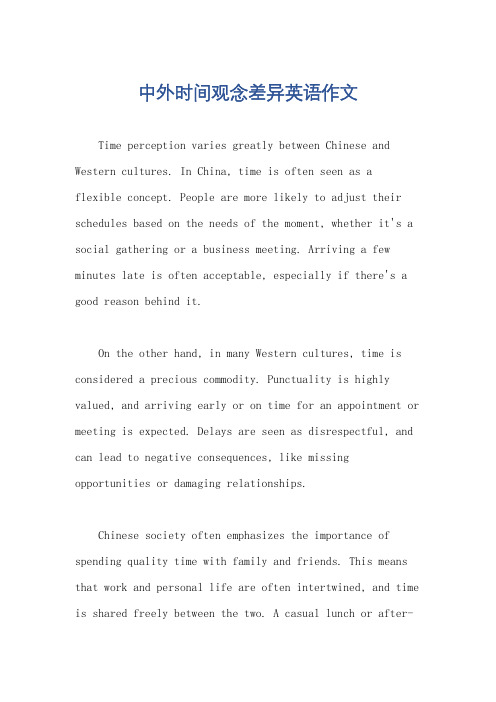
中外时间观念差异英语作文Time perception varies greatly between Chinese and Western cultures. In China, time is often seen as aflexible concept. People are more likely to adjust their schedules based on the needs of the moment, whether it's a social gathering or a business meeting. Arriving a few minutes late is often acceptable, especially if there's a good reason behind it.On the other hand, in many Western cultures, time is considered a precious commodity. Punctuality is highly valued, and arriving early or on time for an appointment or meeting is expected. Delays are seen as disrespectful, and can lead to negative consequences, like missing opportunities or damaging relationships.Chinese society often emphasizes the importance of spending quality time with family and friends. This means that work and personal life are often intertwined, and time is shared freely between the two. A casual lunch or after-work drink can easily last for hours, with no fixed schedule or agenda.Contrastingly, in Western cultures, work and personal time are often strictly separated. Once the workday ends, people tend to focus on their personal lives, leaving work-related matters behind. Appointments and meetings are scheduled with precision, and any deviation from the plan.。
中西方时间观念差异英语作文

中西方时间观念差异英语作文Differences in Time Consciousness between the East and the WestTime consciousness varies significantly between the East and the West. These differences can have an impact on various aspects of life, including work, social interactions, and personal schedules.In Western cultures, time is often seen as linear and quantitative. Punctuality is highly valued, and deadlines are strictly followed. Schedules are carefully planned, and meetings and appointments are usually scheduled in advance with specific start and end times. Being on time is considered a sign of respect and professionalism.In contrast, in some Eastern cultures, time is perceived more as a flexible and fluid concept. The focus is not solely on precise timekeeping but rather on achieving a certain level of completion or accomplishment. There may be a greater tolerance for delays and a more relaxed approach to schedules. Relationships and the context of the situation may take precedence over strict adherence to time.These differences can lead to misunderstandings and challenges in cross-cultural interactions. For example, in a Western business setting, being late for a meeting may be seen as unprofessional, while in some Eastern contexts, it might not hold the same significance.Understanding and respecting these time观念differences is essential in building effective relationships and successful communication across cultures. It is important to be aware of and adapt to the time expectations of different cultures when engaging in international collaborations or traveling abroad.This essay highlights the key differences in time consciousness between the East and the West, but it is important to note that these are generalizations and individual variations exist within each culture. By acknowledging and embracing these differences, we can enhance our intercultural competence and navigate diverse time-oriented situations more gracefully.。
中美时间观念的对比研究(一)

中美时间观念的对比研究珍惜时间(time thrift)的概念在16世纪就开始在西方流行。
当19世纪钟表大规模生产以后,时间对人们的生活方式与观念有了更深入的影响。
虽然时间已经成为人类社会共有的认知概念,但分属不同文化的人们的社会实践不同,历史地理环境不同,各自形成的价值观、世界观、人生观不同,人们赋予时间的意义和利用时间的方式也就不可能没有差异。
因此当中国人和美国人(美国人是西方国家中制定时间表最严格细致的,所以本文主要探讨中美间的差异)进行交际时,时间作为一种无形的向导,就会对人们的言行产生重要的影响,从而使交际达不到预期的目的。
一、中美时间观念差异的渊源二、时间观念差异的体现上面主要是从理论的角度介绍了中美时间观念差异的渊源,下面将用实例进一步阐述部分理论。
1.循环时间观和线性时间观——最后的期限(deadline)最后期限这个词语之所以能在美国出现,完全是美国人的时间观念在作怪。
由于美国人认为时间是一条长线,人有出生就会有结尾,不像中国人所想,今生用完还有来生,今天过完明天又是新的一天,所以他们就有一种“时间危机”,好像如果不和时间赛跑,时间就会飞快流逝,永不再回。
因为珍惜时间,在美国现代企业的生产调控领域中首先出现了“最后期限”一词。
美国人对这个词相当重视,如果逾期,双方都不会愉快。
2.过去取向与未来取向——谁是时间的奴隶一个初入美国社团的中国人一定会发现这样一个现象,几乎每个美国人手中都有一个schedule book或者叫diary book。
当你要和他(她)约定某个时间出去吃饭时,他(她)会打开这个本子确认一下那个时间是否有空。
制定近期(几周到一两个月)计划是美国人未来时间取向的典型体现。
近年来中国人虽然受西方文化的影响,也开始制定计划,工作手册的出版与发行量证明越来越多的人们已经养成这种工作习惯。
中国人参加社交活动出于谦卑的传统是比较守时的,但是活动的时间往往是没有限制的。
例如,人们在约定见面时,只定开始的时间,却从来不提结束的时间。
西方时间观念英语作文
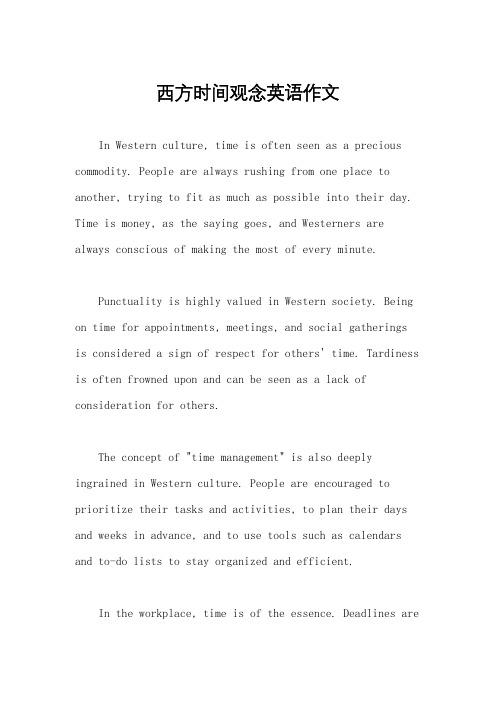
西方时间观念英语作文In Western culture, time is often seen as a precious commodity. People are always rushing from one place to another, trying to fit as much as possible into their day. Time is money, as the saying goes, and Westerners are always conscious of making the most of every minute.Punctuality is highly valued in Western society. Being on time for appointments, meetings, and social gatheringsis considered a sign of respect for others' time. Tardiness is often frowned upon and can be seen as a lack of consideration for others.The concept of "time management" is also deeply ingrained in Western culture. People are encouraged to prioritize their tasks and activities, to plan their days and weeks in advance, and to use tools such as calendars and to-do lists to stay organized and efficient.In the workplace, time is of the essence. Deadlines aretaken very seriously, and employees are expected to deliver their work on time. Procrastination is often seen as a sign of laziness or inefficiency, and Westerners pride themselves on their ability to meet deadlines and produce high-quality work in a timely manner.Leisure time is also carefully managed in Western culture. People often schedule their free time with activities and social engagements, and the concept of "downtime" or simply doing nothing is sometimes seen as a waste of time. There is a strong emphasis on being productive and making the most of one's leisure time.Overall, time is a precious and valuable resource in Western culture. People are constantly aware of the passing of time and strive to make the most of every moment. This mindset can lead to a fast-paced and sometimes stressful way of life, but it also encourages efficiency, productivity, and a strong work ethic.。
英语作文时间观念的重要性100词
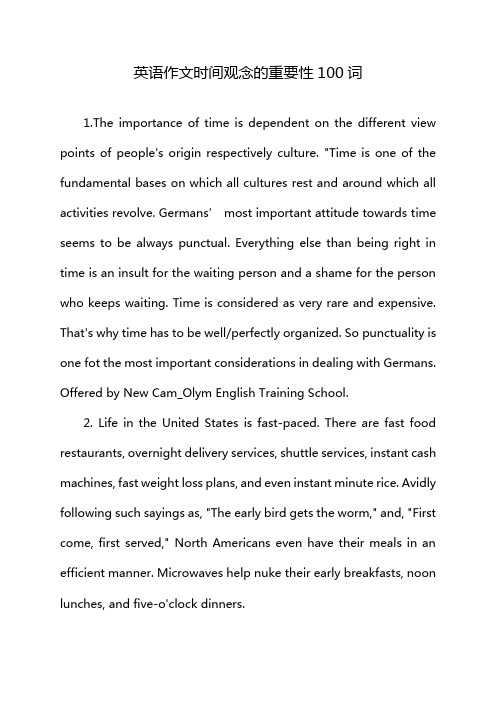
英语作文时间观念的重要性100词1.The importance of time is dependent on the different view points of people's origin respectively culture. "Time is one of the fundamental bases on which all cultures rest and around which all activities revolve. Germans’ most important attitude towards t ime seems to be always punctual. Everything else than being right in time is an insult for the waiting person and a shame for the person who keeps waiting. Time is considered as very rare and expensive. That's why time has to be well/perfectly organized. So punctuality is one fot the most important considerations in dealing with Germans. Offered by New Cam_Olym English Training School.2. Life in the United States is fast-paced. There are fast food restaurants, overnight delivery services, shuttle services, instant cash machines, fast weight loss plans, and even instant minute rice. Avidly following such sayings as, "The early bird gets the worm," and, "First come, first served," North Americans even have their meals in an efficient manner. Microwaves help nuke their early breakfasts, noon lunches, and five-o'clock dinners."Time is money" for big businesses. Everyone follows set agendas. Minutes are taken at meetings that are precisely scheduled. North Americans take pride in juggling busy work schedules and still finding time to spend with family and friends.。
- 1、下载文档前请自行甄别文档内容的完整性,平台不提供额外的编辑、内容补充、找答案等附加服务。
- 2、"仅部分预览"的文档,不可在线预览部分如存在完整性等问题,可反馈申请退款(可完整预览的文档不适用该条件!)。
- 3、如文档侵犯您的权益,请联系客服反馈,我们会尽快为您处理(人工客服工作时间:9:00-18:30)。
On the Consciousness of Time in American EnglishAbstract: Americans generally emphasize the value of time, pay attention to the speed and efficiency. Actually, time should be seen a kind of silent language, because it contains abundant cultural connectation and has particular sequence, structure and meaning. If we say that this kind of silent language exists in the deep structure of culture, we can say that the sound language is manifest objectively in the social activities. It can be found obviously the project of the American consciousness of time.Key words : American English; culture; the consciousness of time;论美国英语中的时间观念内容摘要:美国人非常重视时间的价值,讲究速度和效率。
实际上,时间是一种无声的语言,它蕴含着丰富的文化内涵,具有特定的顺序,结构和意义。
如果说这种无声的语言栖存于文化的深存结构之中,那么有声的语言则是它在人们社会生活中的客观体现。
我们可以发现美国人的时间观念在美国人生活中得到了充分的反映。
而在美国英语中我们也显然可以发现时间观念的投影。
关键词:美国英语;文化;时间观念People who come from different cultural background have different views of time. In intercultural communication, this kind of difference usually causes misunderstanding between the two parties who are communicating and produces some unpleasant barriers. Therefore, when we study American English, we should not overlook this key point.The famous American anthropologist Edward T. Hall once had a comparatively deep and thorough study on this topic, what is more, he made a brilliant exposition in The Silent Language which was published in 1959. Hall has a contrast research on the concept of time which has been integrated into people’s consciousness. But what he mainly discusses is the ways of controlling and using time by Americans and the meanings of time – this silent language – in American culture.To explain the differences and relations of the consciousness of time on different conditions, Hall divides them into ranges which have three obvious characters: regular time, non-regular time and technique time. In this frame, seen from the regular time point of view, it is 365 days (the leap year adds one intercalary day) for so-call one year,12 months or 52 weeks .In other words, the “one year” which is showed on the calendar is regular time of one year .However, sometime “year” is one of very vague concept. For example,’’Oh, it takes years to get that done.”The “year”in this sentence does not really point a few years. It is likely to be a way to express the speaker’s exaggrative attitude and emontion. It emphasizes”very long time “While “the long time” is perhaps on the non-regular time which Hall called. The last kind is technique time, which does not contact with the common people greatly. The concept of “year” of astronomers belongs to it.Then considering from the two angles of regular time and non-regular, what kinds of characteristics does the Americans’consciousness of time have? Firstly, Americans attach great importance to the value if time. Time is considered as the tangible thing that can be measured, divided and made up.Hall thinks that in contemporary American society, the smallest set of regular time have been declined to 5 minutes. This is to say, for many social activities, the every short 5 minutes also become the period of time which can not be despised. For instance, a person is 5 minutes’ late. He will be aware of this himself and apologize the other people. In people’s mind, various sets of regular time (such as an hour, a week, a month, a season etc…) have very explicit boundary .What matter should be handled at what time and what should be completed at what time have a careful plan.Although time is “silent language”, it’s inherent meanings often have got a full expression through the sounded language. In the collocation of American English,”time” can be used with following verbs: buy, sell, save, spend, waste, lost, make up, measure. We can know from above that “time” is unstood a kind of thing which is merchadlike and the product whit honest price tag displayed. Though” time is money “listens to cliche, it is still a belief what most Americans follow scrupously.Americans are famous for punctuation. In this speech, we can easily find a lot of expression of “ on time” or “in time “, such as punctual, on schedule, on time, on the minute, to the minute , on the hour, at the appointed time, at the stated time , intime ,in good time, timely, well-timed and so on. In American culture, they take going to an oppointment on time for granted, while the lateness (particularly be late without reasons) is disrespectful. When Americans contact with other culture people, the other side’s unpunctuation often causes strange dissatification. It is even explained to their humililate deliberately. This kind of experience and feeling of American diplomat in a country of Latin American is mentioned in Hall’ book.Handling affairs with plans is a traditional characteristic in America this kind of wording, such as schedule, aganda are used very widely in American English. Here are some examples which are related to “schedule” or “agenda” have a full schedule, map out a schedule, accomplish something according to schedule, place on the agenda, my agenda for today starts with …… just because of this, once Americans find themselves have been behind the schedule, they will be carmped restless and make greatest efforts to speed up the rate of progress. Seen from a different angle, because Americans like handling affairs with plan, they will inform the relevant persons in advance not at the time when they want to have business talks, hold an academic or social activity. Tast minute notice will arouse dislike feeling. we should not adopt it, unless there is no choice. Another problem which involves regular time where we must treat seriously is dealine what Americans often say, whether the deadline can be obeyed relates to the prestige and benenfits of a group or person. In certain culture, it even involves legal responsibility. The so-called deadline usually can be expansion and contration leeway. Virtually it belongs to the concept of non-regular time. This becomes obvious constraction with the above mentioned American culture circumstance.American got used to quatify the concept of time. The following examples show this distinuisting feature. “I’ll be three in ten minutes.”“It will take six months to finish that job”“ I was in the Army for four and a half years”. Language and the thinking mode connect closely. The words quoted here shows a kind of tendency of the thinking activity from a facet.Generally speaking, Americans pay more attention to the present the future, no the past when they think of a problem. What they are deeply concerned is how to make use of the opportunities before their eyes to contunue their struggling after saying good-bye to yesterday. Following preverbs which Americans like to use can reflect the style of cherishing opportunities:“Make hay while the sun shines.”“Take time by the forelock” . ““Time and tide wait for no man.”“Time lost can’t be won again.”“Never put off till tomorrow.”“Tomorrow never comes.”“One today is worth two tomorrow.”In the preceding part, we talk about handling affairs with plans is one of characteristic in American culture. What we have to supplement and explain is when an American makes a plan, they pay attention to it can take effect in a short time. Even it is an very important and big plan, they also hope it can produce preliminary achievement which can be seen or touched within one or two years.Five years or ten years is already very long time. If the plan can’t have a good effect, tit is only considered as a failed or not too successful plan at least. From this, the concept of “future”, in Americans mind mainly refers to “not too long last of future”. They often add some definite decorative words such as in the immediate future, in the near future, in the foreseeable future, in the not too distant future. Obviously, this kind of decorative words all bring a certain meaning of emphasizing.Pursuing efficiency is not equal to work hare and never stop for a moment. Although “woraholic” also is not rare, most Americans pursue the life style of working with serious attitude and enjoying themselves where they are amusing. Americans understand the truth of “heart have no two use.” They used to do one thing at a time. This is what Hall says the monochronism which is related with the conceptof non-regular time. It’s not different to find out that it exists certain related factors between high working efficiency and monochronism.Now let’s come non-regular time. There are some phrases and expressions which are related to non-regular time, such as: some, presently, for a while, before long. The meanings of these phrases and expressions are all ambiguous and vague, but people can distinguish the basic meanings and basic meanings use these phrases and expressions in an effective way. For example, when a friend says to you “I’m coming presently”, according to liguistic environment of the current time and the understanding of your friend, you can judge generally how long is the “presently”. So even using some concepts of non-regular time, for these understanding of them, the participants of speech event still exist a kind of tacit understanding. It is worth paying attention to that the concept of non-regular time has great difference in different cultures. There is obvious difference when an American says “waiting a long time”and “waiting a very long time”. But in the Arabic culture, people don’t differentiate the last of time at all (E.T. Hall 1959:151)This consciousness is corresponding with Americans’ quick living rhythm. Living quick rhythm often makes people feel a kind of strong invisible pressure. As a result, the degree of strong pursuing speed has arrived almost frenzy. This kind of phenomenon speeds every aspect of American life and also the language that they use.It is difficult to find the people who walk leisurely and carefreely in the both side of prosperous avenues of big cites like New York, Chicago. People always get one place to do something in a hurry. There is no more accurate to describe them. If the acquaintances meet on the street, they also send the best regards muntually hastily, even come to stop to talk, after a few words, one side will say to another sorrily: “ Oh dear, I’m late. I’ve got to run.”The managing method of food processing industry and restaurant industry reflect Americans’ pursuit of speed.Most of food in the supermarket or grocery is process food except the fresh vegetable or fruit. Ti appears a lot of this kind of new words in American English vocabulary this century such as bread mix, frozen food, cake mix, instant coffee, canned food, dehydrared vegetable, soup mix, substitute food and preserved food so on.This kind of food can be eaten after the last processing and this simple processing can be done at home .It really can save a great deal of time. However, Americans do not always make a living by simple food. There is more time to prepare the dinner. The dinner is usually very formal and there are some dishes cooked by themselves. It is more ceremonious when a festival comes or there are some guest. Going to a restaurent has the same principle. They often go to a traditional restaurent to enjoy a complete set service when relatives or friends have a meeting or hold a family celebration activity . Under the urgent situation, the main purpose of going a restaurant is filling fully the belly. In that case, they are mostly to a fast food shop . The persons who have been American for a period all know that there are various fast food shop s almost in each corner of the cities the cities. And the business is very prosperous .We have analyzed contemporary American s’ conscious of time and the reflection of this consciousness generally emphasize the value of time , pay attention to the speed and efficiency . Actually, time should be seen a kind of silent language, because it contains abundant cultural connetation and has particular sequence, structure and meaning. If we say silent language exists in the deep structureof culture, we can say that the sound language is the manifest obviously in the social activities. It can be found obviously the project of the American consciousness of time.Bibliography:1.Zhu Yongtao,A Handbook to Essentials of British and American Cultures, Beijing :Foreign Language Teaching and Research Press, 1994i Luning,Cultural Background for English Study: A Survey of Europe,Beijing :Peking University Press, 20043.Deng Yanchang,Liu Runqing,Language and Culture,Beijing : Foreign Language Teaching and Research Press, 19894.Wang Bo, Selected Readings in American History & Culture,Beijing :Peking University Press, 2004。
